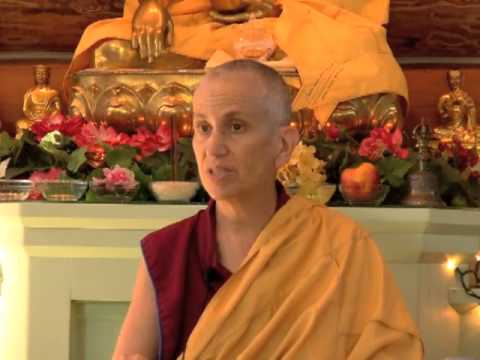Faith based on reason and conviction
One of our inmates that I write to was telling me about one of his relatives who has great faith in God, and the reason is because when she’s had certain problems in her life and prayed, then the problems got solved. She was stranded on the highway, somebody showed up to help her. If she was sick, she got well. These kinds of immediate helpful things that sometimes even may seem rather miraculous or things that one can’t ordinarily explain. That is what gave her faith in God. So the inmate was questioning that, like is that really a valid basis for a belief?
Now, if you look, every religion has stories of miracles, doesn’t it? Every religion has stories of people who pray to whoever it is they believe in, and their immediate personal problems get solved. That alone I don’t think is sufficient. When people like us are looking for a path to follow, that’s not sufficient for actually generating faith because everybody has that. It’s not unique to one particular religion. Also, our own personal dilemmas of this life getting solved, that’s wonderful, but that’s not a spiritual path that leads us to liberation.
That’s not a path that leads to liberation. It’s something that might inspire faith in that person, but it doesn’t give you anything to practice. It doesn’t take you out of all of samsaric suffering forever because it doesn’t even touch the root of suffering—the ignorance grasping at true existence. I think when we’re looking for a spiritual path that leads to liberation, that leads to enlightenment, then we have to actually search for something where there is a path of practice to follow that will eliminate the root of all of the dukkha, of all of the suffering. Therefore, we need a path which teaches about emptiness, which teaches the antidote to how to cut the ignorance that creates the afflictions, that generates the karma, that produces rebirth. Because without doing that, we may have good things happen to us in this life and some immediate dilemmas be solved, but we’re still taking rebirth again and again in samsara, aren’t we? When we think about generating the right view, which is so important to have at the beginning of our practice, and have the correct worldview—this is a very important element of it. We can see that when we understand emptiness and how it overcomes ignorance. Even if we just have a rough general understanding of that, then when we have faith in the Buddha, Dharma and Sangha, it’s a kind of faith that’s based on reason. It’s based on conviction. We know there’s an actual path to follow that will lead us to the cessation of dukkha.
Audience: [inaudible]
Venerable Thubten Chodron: The comment is maybe they believed in God first and then they made their prayers, but they may not have had a very firm belief in God, and just that’s all you heard in your life, and you never practice, and at the time you need something that’s the thing that pops in your mind. You may have heard of God before, you may have believed in God before, but in any case, the point that I’m trying to make here has nothing to do with that. The point I’m trying to make is that we really need to use reasoning to generate firm conviction and we need to seek a path that leads out of suffering. Not just something that brings some kind of temporary benefit. I just want to make sure the point gets across here.
Venerable Thubten Chodron
Venerable Chodron emphasizes the practical application of Buddha’s teachings in our daily lives and is especially skilled at explaining them in ways easily understood and practiced by Westerners. She is well known for her warm, humorous, and lucid teachings. She was ordained as a Buddhist nun in 1977 by Kyabje Ling Rinpoche in Dharamsala, India, and in 1986 she received bhikshuni (full) ordination in Taiwan. Read her full bio.


